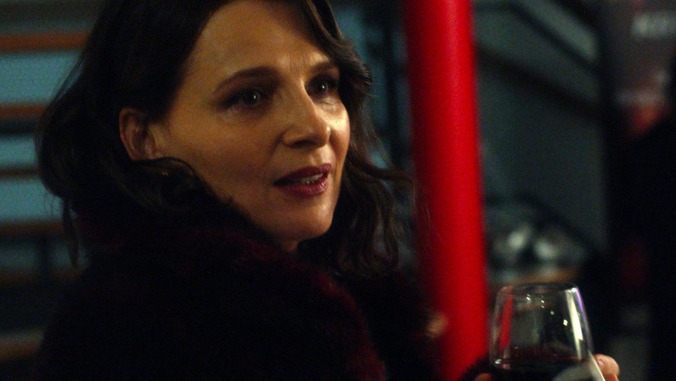Juliette Binoche gets candid about her challenging new role, her 'memory drawer' of characters, and Coco Chanel
The Oscar winner reunites with director Claire Denis for Both Sides Of The Blade

If you’re a filmmaker, you can’t ask for a better on-camera muse than Juliette Binoche. So it makes sense that Claire Denis, as accomplished and revered a French director as Binoche is an actor, has turned her lens on the Oscar-winning English Patient star in three recent films—and presented her with completely different challenges each time. Binoche brought rom-com-esque humor to Let The Sunshine In, then strange, deranged eroticism in the sci-fi-inflected High Life, and now, romantic vulnerability in the Berlin International Film Festival award winner Both Sides Of The Blade (in select theaters July 8).
The story of modern Parisian woman Sara (Binoche), whose relationship with Jean (Vincent Lindon) becomes unexpectedly threatened by his old friend and her old flame François (Grégoire Colin), Both Sides Of The Blade is a film that foregrounds profound, resonant, raw emotion in its actors. As Binoche reveals, filming it wasn’t exactly a picnic; her artistic mission, taking audiences “to the intimate place of people’s hearts, minds, and bodies,” was put to the test like never before. Amid a particularly busy year—she played Sophie Brunet in HBO Max’s hit The Staircase, and will next appear in the thriller Paradise Highway and as Coco Chanel in Apple TV+’s series The New Look—Binoche made time for The A.V. Club.
The A.V. Club: What was it like reuniting with Claire Denis for Both Sides Of The Blade?
Juliette Binoche: It was quite different as a whole film, as a whole experience. And I’ve felt the same with directors I work with two or three times: they’re different circumstances, different stories, different periods of time in my life, in their lives. So we’re changing, transforming as we go. And different actors, it brings another energy. This one was tougher. Claire, I felt, was letting it happen between Vincent and myself. Knowing that we’re quite strong personalities and very different in the way we work, I think she wanted to film as an observer in that configuration.
But I have to say, at the end of it, I found it very painful because I felt alone. I even went through a period of time where I felt betrayed because I take things with my heart, not my mind. [Laughs] Once, I remember taking my script and throwing it on the floor. Now I can laugh about it and we speak to each other and all, but it was a challenge. And I think not only for me, also for Vincent, because he [hasn’t worked with] actresses who say, “I’m sorry, it’s not going to happen like that.” And I think it was also difficult for Claire because the subject matter itself is very tough. You know, it’s a conflict. It’s really a confrontation of fears, and need of freedom, and need of control. I didn’t know Vincent and I didn’t know his reputation, so it was a discovery. And it was tough, that’s all I can say.
AVC: How did you approach Sara and her journey in this story?
JB: I think Sara is independent. She’s very involved in her work. She seems to be a happy person. She’s in that relationship, even though it must be sometimes heavy to be the one dragging the whole family. She cares for Jean, her boyfriend; there’s love between them. And yet, when she meets with a past life’s love, she’s the first to be surprised to feel that need in her. And that heart beating and that overwhelming feeling she has for that past love. So instead of putting it aside—she is not that kind—she wants to understand why she feels that. And also it’s something she cannot control. She needs to investigate, needs to explore, needs to live. And of course, it brings a lot of fear into her partner and probably into herself as well. But there’s something she needs to go through. And she’s wishing for that love she’s having, that he will trust that they can pass that wave together.
AVC: Do you develop a shorthand with a director like Claire, who you’ve worked with multiple times?
JB: No, Claire is waiting—what I feel with me anyway—she’s just waiting to be touched. It’s as simple as that. She’s waiting to believe it and to be touched. And whether it’s believable or not, she doesn’t care, it’s more [about being] touched. To feel something.








































